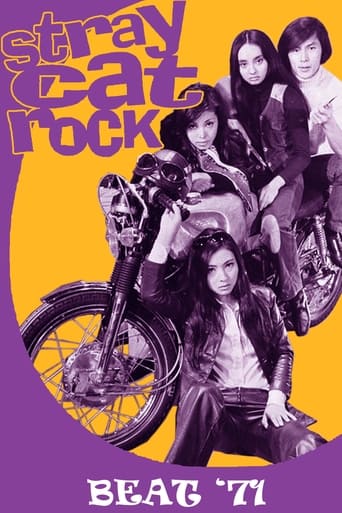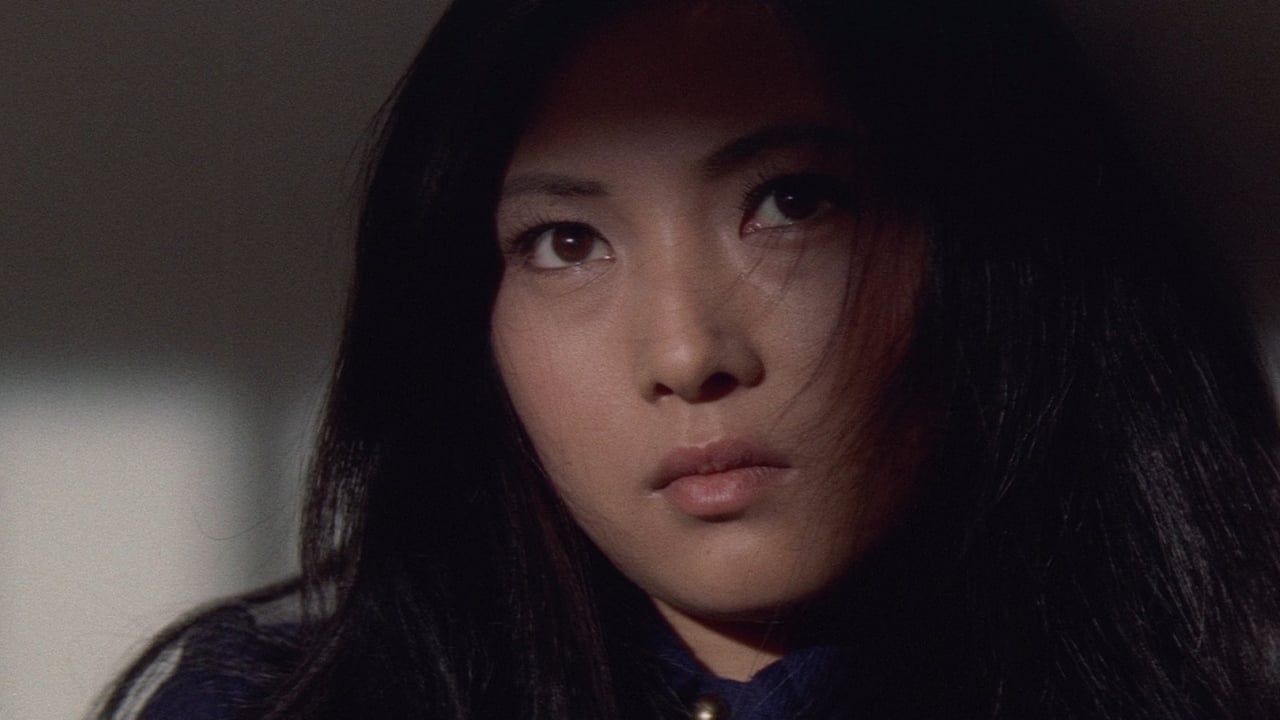zetes
The fifth and final Stray Cat Rock film finds Toshiya Fujita (who also directed the second installment, Wild Jumbo, but is most famous for making the Lady Snowblood movies) behind the camera. Like Wild Jumbo, Beat '71 isn't about girl gangs. No, here Meiko Kaji and Tatsuya Fuji are members of a hippie commune living in Tokyo. Kaji isn't even in this one all that much, though she's a central character. She spends much of the movie imprisoned with the other hippies attempting to save her. Kaji's boyfriend has been kidnapped by his politician father, who wants to save him from hippiedom, and frames Kaji for murder. She escapes and goes after the boyfriend, but is then captured and imprisoned in the politician's mansion. Eiji Go once again plays the villain, the leader of a gang hired by the politician to keep the hippies away. This is probably my third favorite of the series. Lots of fun stuff here, lots of great music. There is an annoying little kid, an adopted son of one of the hippies, but he isn't too bad, even though he probably has more screen time than Meiko Kaji.
unbrokenmetal
'Beat 71' is the last entry of the Stray Cat Rock series, comprising of five movies in total. While the first, third and fourth were directed by Hasebe in a dark and gritty city movie style, the second and fifth were directed by Fujita in a brighter countryside style, less seriously, but I actually prefer these two over the other parts of the series, they are simply more fun.'Beat 71' tells us about Furiko (Meiko Kaji) and her boyfriend Ryumei (Takeo Chii), who is the son of a mayor. The politician thinks his son should continue his business career instead of hanging around with hippies. He has the two abducted and throws Furiko in a cell so she will no longer distract Ryumei from work. Their hippie friends however make a camp in front of the mayor's house, let a rock band play there and announce loudly they will stay until they get Furiko back. The mayor lets them drive out of town by the police, so they hide in a western town. Now all depends on Ryumei...Very entertaining flick with a lot of bizarre western movie influences, for example when a guy starts his motor-bike, you don't hear an engine, only the hooves of a horse. Meiko Kaji of 'Lady Snowblood' fame unfortunately has a rather simple role that does not allow her a memorable performance. But the team effort is convincing.
random_avenger
All good things must come to an end, including the Stray Cat Rock series with five entries in total in the franchise. After four movies all released in 1970 (three of them directed by Yasuharu Hasebe), the final part was helmed by Toshiya Fujita who had also made the second film Wild Jumbo. By this time the differences between Hasebe and Fujita's directing styles have become clearer than before but in the end I think both did a good job with the series.Hasebe's three Nora-neko films all dealt with gang rivalries in big cities while Fujita's first effort was a leisurely caper story largely set on a sandy beach. Likewise, Crazy Rider '71 (a.k.a. Wild Measures '71 a.k.a. Beat '71) takes place outside busy urban environments and comes across as much lighter in tone than its immediate predecessors. The plot gets started when Furiko and Ryumei (Meiko Kaji and Takeo Chii), two members of a park-dwelling hippie gang from Shinjuku, are ambushed by a biker gang. Ryumei stabs one of the thugs to death but is forcibly taken away by his shady politician father (Yoshio Inaba), leaving Furiko to take the blame for the crime. She cannot forget him, escapes from prison in order to find him again and is soon joined by her gang in the small town of Kurumi. However, Ryumei's powerful father has no intentions of letting the bohemian hippies influence his son ever again.Even though there are many tragic plot twists, most of the time the mood is significantly more comedic than before. The general bumbling of the hippies and their young adopted son Mabo, idyllic scenes of tandem cycling, roaming in a Wild West theme park, a whinnying sound effect on a motorcycle and other details all create a contrast to the dramatic finale that is probably the most spectacular and action-packed in the whole series. Additionally, the music is a lot softer than before but still almost as groovy and funny as always, especially the totally random song performance of the real-life psychedelic rock group The Mops in the middle of everything. There is also some drug use and a light naughty scene, all in comedic contexts unlike similar themes in Hasebe's films.Even though I like the movie overall, it can be noticed that the series was clearly running out of steam by this point. The star of the franchise Meiko Kaji is absent for a large part of the runtime and her character's relationship with Ryumei (a.k.a. Takaaki) is not paid much attention by the writing, so the emotional background for the big showdown at the end remains vague. Ruymei's new girlfriend Ayako also comes across as a somewhat unnecessary and underused character, not to mention how it is difficult to grasp what the writers were thinking when killing off a certain character completely out of the blue at one point. Furthermore, the trademark camera trickery is heavily downplayed this time, reducing the style to just some quick zooms and occasional hand-held shaking. Still, the actors playing the hippies are pretty funny throughout; I don't know their names but I think at least Tatsuya Fuji is among them, as expected in this franchise.When all is said and done, I think Crazy Rider '71 is a very watchable youth gang flick, flawed or not. Those who enjoyed Fujita's Wild Jumbo should definitely give this one a go since the similarities are obvious from early on, but with some reservations I would recommend Fujita's movies to Hasebe's fans too. The very last shots leave the film's ultimate "message" open for interpretation – hopeful or not? Watch the movie, decide for yourself and take a look at the other parts as well.


 AD
AD


